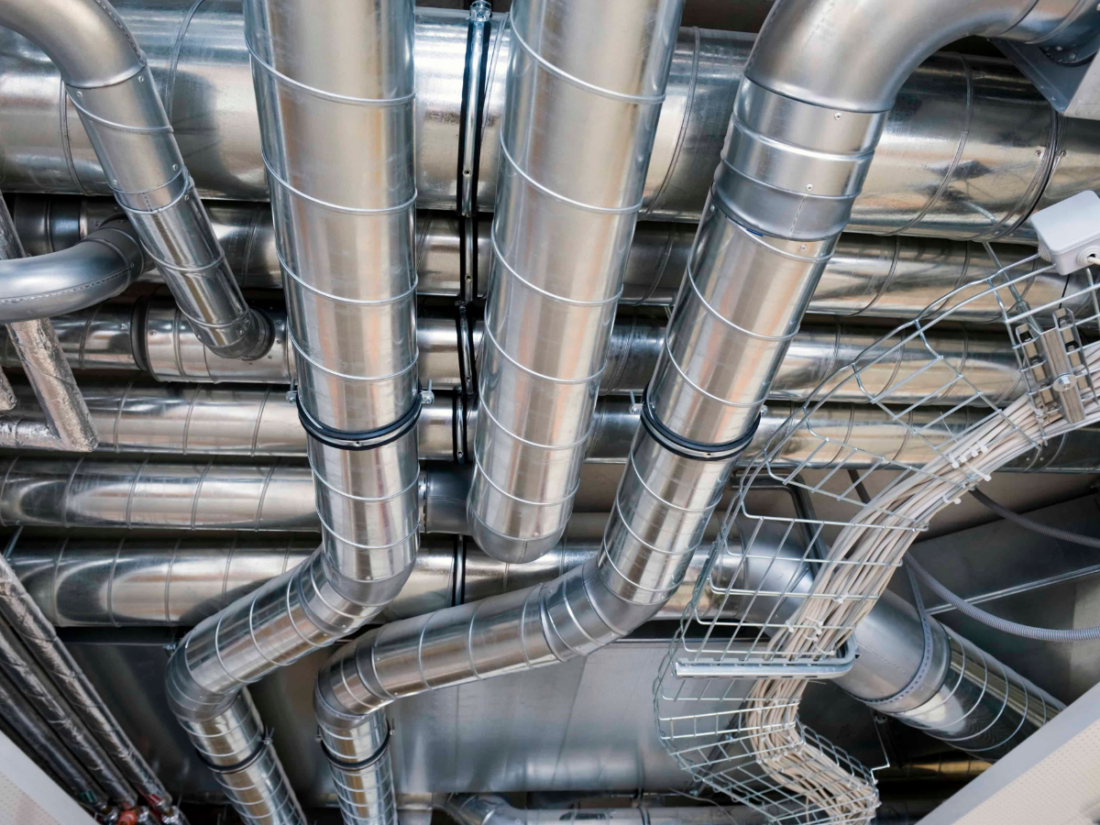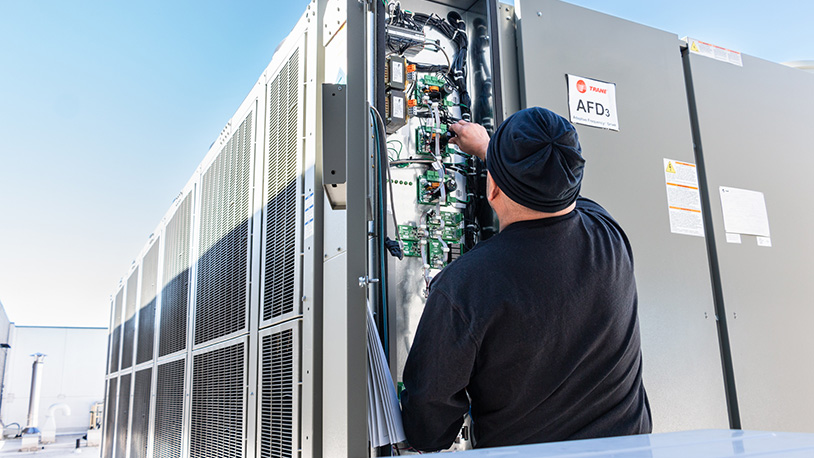Discover how skilled HVAC experts can boost your property comfort right now
Wiki Article
Exploring the Vital Parts of a Reliable HVAC System
A reliable cooling and heating system is constructed on a number of vital components that work in harmony. Each component, from the thermostat to the ductwork, plays a vital duty in preserving comfort and energy efficiency. Comprehending these aspects is crucial for enhancing performance and enhancing indoor air high quality. As one analyzes these elements, the elaborate partnerships between them expose insights into enhancing total system effectiveness. What particular elements add most to this efficiency?The Duty of the Thermostat in HVAC Effectiveness

Although often forgotten, the thermostat plays an important role in the performance of HVAC systems. HVAC experts. This small tool serves as the primary nerve center, managing temperature settings and making sure excellent comfort within a room. By properly picking up the ambient temperature level, the thermostat connects with the home heating, air, and air flow conditioning units to preserve the wanted climate
An effective thermostat reduces energy intake by turning on the HVAC system just when required, therefore stopping extreme home heating or air conditioning. Modern clever and programmable thermostats improve this performance further by enabling users to set timetables and remotely readjust settings, adapting to day-to-day routines.
The placement of the thermostat is essential; incorrect place can lead to inaccurate temperature level analyses, resulting in inefficient procedure. On the whole, a well-functioning thermostat not only boosts comfort but also contributes noticeably to power savings and the long life of the cooling and heating system.
Recognizing the Significance of Air Filters
Air filters offer an important feature in HVAC systems by guaranteeing that the air flowing within an area continues to be healthy and clean. These filters catch dirt, irritants, and other contaminants, avoiding them from being recirculated throughout the environment. By catching these particles, air filters add to improved indoor air top quality, which can substantially benefit residents' health and wellness, especially those with allergies or breathing conditions.Furthermore, maintaining clean air filters enhances the efficiency of HVAC systems. Stopped up filters can limit airflow, causing the system to function harder to preserve desired temperatures, bring about boosted energy consumption and greater energy expenses. Frequently changing or cleaning up filters is a crucial upkeep action that can lengthen the lifespan of HVAC devices. Ultimately, recognizing the relevance of air filters enables home owners and structure managers to take aggressive procedures to assure a well-functioning, efficient heating and cooling system that advertises a comfy and secure interior setting.

The Performance of the Heating System and Heat Pump
Heating systems and heatpump are vital elements of cooling and heating systems, in charge of providing heat during cooler months. Furnaces operate by home heating air with burning or electrical resistance, after that dispersing it throughout the home by means of ducts. They generally provide rapid home heating and can be sustained by gas, electrical energy, or oil, depending upon the system type.On the other hand, heatpump move warm rather than generate it. They draw out heat from the outdoors air or ground, even in reduced temperature levels, and transfer it inside. HVAC experts. This dual functionality enables heatpump to additionally supply air conditioning in warmer months, making them versatile choices for year-round environment control
Both systems require appropriate upkeep to guarantee effectiveness and longevity. While heaters master severe cold, heatpump can be useful in modest climates. Recognizing their distinct performances aids home owners in picking the most ideal alternative for their heating requires.
Exploring the A/c System
The cooling system is a vital element of a/c systems, readily available in various types to fit various needs. Comprehending the efficiency rankings of these systems is important for making notified choices about energy usage and expense. This section will certainly explore the diverse kinds of air conditioning system and clear up just how performance ratings influence efficiency.Sorts Of Air Conditioners
While numerous elements influence the option of cooling systems, recognizing the different kinds readily available is vital for home owners and structure supervisors alike. Central air conditioners are designed to cool whole homes or buildings, making use of a network of air ducts for air flow. Window units offer a more local option, ideal for small areas or solitary spaces. Mobile a/c unit give adaptability, permitting customers to relocate the unit as required. Ductless mini-split systems are another alternative, integrating the performance of main systems with the comfort of zoning, as they require no ductwork. Ultimately, geothermal systems harness the earth's temperature for energy-efficient air conditioning. Each type comes with distinctive benefits, making informed selections important for effective climate control.:strip_icc()/GettyImages-1512099092-87093749945241799ea83d87154b40ef.jpg)
Performance Ratings Described
Comprehending efficiency scores is essential for selecting the appropriate a/c device, as these metrics give understanding into the system's performance and energy usage. The most common ranking for ac system is the Seasonal Energy Efficiency Ratio (SEER), which gauges the cooling outcome during a regular cooling period split by the total electric power input. A higher SEER indicates much better efficiency. Furthermore, he has a good point the Energy Efficiency Proportion (EER) is utilized for determining efficiency under particular problems. One more crucial metric is the Power Celebrity accreditation, which indicates that an unit satisfies strict energy efficiency standards. By examining these scores, customers can make enlightened selections that not only optimize comfort but likewise reduce power costs and environmental influence.The Significance of Ductwork and Air movement
Effective ductwork layout and air flow administration play essential functions in the overall efficiency and performance of cooling and heating systems. Appropriate ductwork guarantees that conditioned air is distributed equally throughout an area, reducing temperature changes and boosting convenience. Properly designed air ducts reduce resistance to air flow, reducing the workload on HVAC tools and eventually lowering energy consumption.Airflow administration entails purposefully putting vents and signs up to improve the flow of air. This protects against common concerns such as hot or cold areas, which can happen when airflow is blocked navigate to these guys or improperly balanced. Furthermore, the ideal air duct materials and insulation can additionally boost performance by reducing warmth loss or gain throughout air transportation.
A reliable ductwork system not just adds to power savings but can additionally lengthen the life expectancy of cooling and heating equipment by reducing unneeded stress (HVAC experts). Recognizing the value of ductwork and air movement is essential for achieving peak Heating and cooling system performance.
Normal Upkeep Practices to Enhance Efficiency
Regular maintenance techniques are essential for making certain peak efficiency of a/c systems. These practices include regular inspections, cleansing, and needed fixings to keep the system running successfully. On a regular basis altering air filters is crucial, as clogged filters can obstruct airflow and minimize performance. Furthermore, professionals need to inspect and tidy evaporator and condenser coils to stop overheating and power wastage.Annual professional examinations are likewise advised, as qualified service technicians can identify potential problems prior to they rise. Lubricating relocating components reduces wear and tear, adding to a longer life expectancy for the system. Moreover, making sure that the thermostat operates properly aids in keeping optimal temperature control.

Often Asked Questions
Just how Frequently Should I Replace My Thermostat?
Thermostats ought to usually be replaced every 5 to 10 years, depending upon use and innovation advancements. Routine checks are suggested to guarantee peak efficiency, particularly if experiencing inconsistent temperature control or enhanced energy costs.What Dimension Air Filter Is Finest for My A/c System?
The ideal size air filter for a heating and cooling system differs by unit style. Typically, it's essential to consult the owner's manual or inspect the existing filter dimensions to ensure peak efficiency and air top quality.Can I Install a Heatpump Myself?
click here for info Mounting a heat pump individually is feasible for experienced individuals, however it calls for understanding of local codes and electric systems. Working with a professional is recommended to assure appropriate setup and perfect system efficiency.Exactly how Do I Know if My Ductwork Is Effective?
To establish ductwork performance, one ought to check for leakages, action air movement at vents, check insulation quality, and review temperature differences between supply and return air ducts. Professional assessments can supply comprehensive understandings into total efficiency.What Are Indications My Heating And Cooling Requirements Immediate Upkeep?
Indications that a HVAC system needs instant upkeep consist of uncommon noises, irregular temperature levels, enhanced energy bills, undesirable smells, and frequent biking. Attending to these problems without delay can prevent additional damages and assurance top system performance.Air filters serve an important function in Heating and cooling systems by ensuring that the air circulating within a room stays healthy and clean. Furthermore, maintaining clean air filters improves the performance of Cooling and heating systems. Ductless mini-split systems are another alternative, incorporating the effectiveness of central systems with the benefit of zoning, as they require no ductwork. Comprehending efficiency ratings is necessary for selecting the ideal air conditioning system, as these metrics give insight into the system's performance and energy consumption. The ideal size air filter for a Cooling and heating system differs by unit design.
Report this wiki page